- Home
- Beverly Cleary
The Luckiest Girl Page 9
The Luckiest Girl Read online
Page 9
Downtown, Shelley was surprised by the crowds of people walking up and down the sidewalks and by the number of cars looking for parking places. She had forgotten that in San Sebastian stores were open on Saturday night. Philip and Shelley parked the bicycle in the rack in front of a small restaurant and soda fountain called the Chicken Coop. The place was crowded and the jukebox was blaring. Another couple was leaving so they were fortunate to get a booth beside the jukebox near the front door. As they sat down at the table, littered with empty milk shake glasses, crumpled napkins, and paper coverings from straws, Shelley looked around her. The walls were papered with a design of mother hens each leading four chicks repeated all the way around the restaurant; the hens and chicks appeared to be marching in endless processions, around and around. Planting boxes were filled with artificial plants and behind the counter a pair of metal arms revolved continually in a plastic vat of orange juice. In the next booth a weary mother tried to appease two tired children with ice-cream sodas.
“What will you have?” asked Philip above the noise.
“A chocolate malt,” answered Shelley. It was then that Shelley saw Katie and her mother sitting on stools eating ice-cream sodas. Katie was slowly spooning the ice cream out of the bottom of her soda. Dejection showed in the way she sat on the stool, the way she put the spoon in her mouth and pulled it out again half full of ice cream. Mavis was looking at Katie with a mixture of sympathy and irritation, and Shelley knew she wanted to say, “Katie, don’t eat your ice cream that way,” but because of Katie’s mood she was restraining herself.
So Katie had not had a good time at the dancing class she had looked forward to with such eagerness. Shelley was sorry. She had really wanted Katie to have a good time, because she liked Katie and because she was grateful to her for her own date with Philip.
A waitress appeared to clear off the table and take Shelley’s and Philip’s orders. “Two chocolate malts and a grilled peanut butter sandwich,” said Philip.
“A grilled peanut butter sandwich!” Shelley could not help exclaiming. She had never heard of such a thing.
“I’m hungry,” explained Philip.
When the waitress had gone, Shelley raised her voice above the noise and said, “I was surprised when you came down from the top of that tree to ask me for a date.” The record on the jukebox ended suddenly and Shelley found herself speaking the last words for everybody to hear.
Philip flashed his wonderful grin. “Maybe I should have swung from branch to branch yelling my bull-ape cry like Tarzan.”
Shelley giggled. “That really would have surprised me.” Shelley saw Mavis pay for the sodas and leave the counter with Katie. “Hi,” Shelley called out when they reached the door.
“Oh, hello there,” said Mavis, as Philip rose awkwardly to his feet behind the table.
“Hi,” said Katie without expression. Whatever was wrong must be very wrong indeed if Katie could not look admiringly at Philip.
Mavis lowered her voice. “We needed a little something to cheer us up,” she said as they went out the door.
“What’s the matter?” asked Philip as he sat down and picked up his grilled peanut butter sandwich.
“It’s Katie,” said Shelley. “Something awful must have happened at her dancing class.”
“Kids that age…” said Philip, leaving his remark unfinished as if whatever he had in mind was such common knowledge that he did not need to say it. The mechanical arm of the jukebox picked another record out of the stack, dropped it into place, and the voices of a quartet boomed forth.
The door opened. “Hey, Wilma,” a man startled Shelley by yelling to the waitress. “Charlie been in yet?”
“Nope. Not yet,” the waitress yelled back.
Philip, used to the ways of a small town, did not appear to notice the interruption. “I wanted to ask you for a date sooner,” he confessed in the lull between records on the jukebox, “but I—I couldn’t.”
Puzzled, Shelley wanted to ask what had prevented him, but she felt that she should not pry. Perhaps he meant that he did not have the courage, although he did not seem excessively shy, since he had asked her for a date in front of Katie. Some boys would not have done that. “I hope you didn’t mind what I said to the Roving Reporter,” she said, not really wanting to bring up the matter but feeling that she must because she still felt guilty about it.
“Oh, that,” said Philip, and laughed. “I hope you didn’t mind what Friz said about you.”
The sound of a slap and the wail of a child came from the next booth. “Charlene, I told you not to put sugar cubes in your soda without taking the wrappers off.” The woman’s voice was tired and sharp. “Just for that I’m not going to buy you no water pistol.”
Shelley lowered her eyes and pulled the wrapper off the straw the waitress had laid in front of her. “No. I—I was pleased by what Friz said,” she admitted, and stirred the milk shake with her straw. The jukebox blared again, making conversation across the table almost impossible. Well, anyway I am with him, thought Shelley, wishing she could put a nickel in the jukebox and buy five cents’ worth of silence. If only they could talk she might find some sign that he was having a good time—or not having a good time. It was the suspense of not knowing that was so hard to bear.
When Philip pulled the tandem out of the rack and they started home, Shelley discovered why riding downtown had been so easy. It had been downhill all the way, because San Sebastian was built on the gentle slope at the front of the mountains. And now the way home was uphill. Shelley pushed harder on the pedals, because it did not seem fair to let Philip do all the work. The street was steeper than it looked.
“This is the widest main street I have ever seen,” said Shelley, managing not to puff.
“The men who planned San Sebastian way back planned it that way so they could turn a span of eight mules,” explained Philip with no sign of a puff.
“Oh,” said Shelley, tempted to let her aching legs coast around with the pedals. “That’s interesting.” The slope seemed to grow steeper with every turn of the pedals.
When Philip stood up on the pedals to exert more pressure on them, Shelley listened for some sign that he, too, was out of breath. His wind was excellent. A line of verse that she had read someplace a long time ago pushed its way into Shelley’s thoughts. She could not recall it exactly, but it was something about, “Does the road go uphill all the way? Yes, to the very end.” It was a perfect description of San Sebastian’s main street.
Shelley gathered all the breath she could spare and said, “It’s such a beautiful night.” She hoped that from then on her silence would be taken for a rapt appreciation of the stars shining down on San Sebastian.
Fortunately the road was level when they turned off the main street, and Shelley partially caught her breath before they turned into the Michies’ driveway. While they parked the tandem in the garage and walked around to the front door, Shelley wondered uneasily what Katie was doing. She opened the front door, and before she turned to face Philip she glanced at the transom at the end of the living room. Katie was not in sight. “Well…good night, Philip,” Shelley said uncertainly. A first good night was so terribly important. It could mean the beginning of so many things or it could mean—good night.
Philip smiled down at Shelley. “You’re a good sport,” he said.
Encouraged, Shelley said, “I’m not much of a Ping-Pong player, but I had fun anyway.”
“So did I,” said Philip. “Say, Shelley, I was wondering—would you like to go to Vincente to the movies next weekend?”
“I’d love to, Philip,” said Shelley happily. So he had had a good time after all! The suspense had ended. Now she knew.
“Swell,” said Philip. “I’ll see you at school. Good night.”
“Good night, Philip.” Shelley silently closed the door. Philip Blanton had asked her for another date! The polite table tennis game, the puffing ride home seemed unimportant. He liked her, she liked him, and Katie ha
d not been on top of the refrigerator. Shelley climbed the creaking stairs as quietly as she could and at the door of her room she hesitated. A strip of light shone beneath the door of Katie’s room across the hall. Shelley waited a moment and then tapped on the door of Katie’s room with one fingernail.
“Come in,” answered Katie in a dull voice, and Shelley entered. Katie was leaning on her dresser, her chin propped on her fists, staring at herself in the mirror. Her mouth was heavily made up with dark lipstick.
“I suppose you had fun,” said Katie in the same dull voice.
“A wonderful time.” Shelley tried not to smile at the sight of Katie’s mouth. Although she knew the answer, she asked, “Did you?”
“No,” said Katie flatly.
“What went wrong?” asked Shelley.
“Everything,” answered Katie, turning away from the mirror. “Just everything.”
“Didn’t the right boy dance with you?” asked Shelley.
“Dance with me!” exclaimed Katie. “He wasn’t even there. Practically no boys came except some whose mothers made them come and you know that type.”
“Yes, I know,” said Shelley. “But why didn’t the boys come? They usually turn up.”
“They didn’t want to make hats,” said Katie. “They said it was too much bother. You know how boys are.”
“Yes,” agreed Shelley, sorry for her. “But didn’t you win a prize for your hat?”
“No,” said Katie. “Pamela did, though. She said she was going to make a hat out of a birdcage and instead she turned up in a straw hat with a little palm tree and a monkey on it. When she wound up the monkey it played a drum.”
“I’m sure your hat was more becoming.” Shelley tried to be comforting.
Katie sighed gustily. “What difference did it make, when I had to dance with girls? Do you think that this lipstick, not that Mommy would ever let me wear it, makes me look sophisticated?”
Shelley managed not to smile. “Well—not sophisticated exactly.”
“It’s just hopeless,” said Katie. “I’m nothing but a wholesome outdoor type. The type that has to lead when there aren’t enough boys to dance with. And it is horrible to be thirteen.”
“Cheer up, Katie,” Shelley said. “You won’t stay thirteen all your life. After all, I was thirteen once.”
“I guess that’s right,” said Katie, brightening. “But you don’t know how lucky you are to be sixteen.”
“Am I?” asked Shelley dreamily. “Well, good night, Katie.” She went to her room and, without turning on the light, stood at the window looking out into the soft, dark night. She recalled how she had felt at thirteen. Nothing had seemed right. The girls were taller than the boys and at dancing class, even when there were enough boys to go around, the girls had really led, because the boys all seemed too confused to learn the steps. And clothes had never fitted properly. And at thirteen there never seemed to be anything to do, because at thirteen a girl is too old for toys and not old enough for dates. Now that she looked back on that age, Shelley knew that she was glad to be through with it, to have said good-bye to so many things.
Shelley smiled in the darkness. Katie was right. She was lucky to be sixteen. She was the luckiest girl in San Sebastian, because she was sixteen and Philip Blanton liked her. Shelley was filled with a wonderful feeling of excitement as if something was about to happen, something more wonderful than anything that had ever happened before. Something magic.
Chapter 7
After Shelley’s first date with Philip, each day seemed more golden and more spellbound. The sun shone and the sky was clear. The oranges were ripening. Violets and iris bloomed in November, Shelley discovered, and felt sorry for these poor confused California flowers that did not know they were supposed to bloom in the spring.
The leggy plants beside the back door put forth scarlet leaves and Shelley saw that these plants that she had thought so ugly were poinsettias. Poinsettias higher than her head! Until now she had seen them only in pots and thought that was the way they always grew.
At the same time the spreading gray-green tree that overhung the two-story garage began to burst with buds, clusters of tiny greenish yellow balls, and Shelley discovered that this was an acacia tree. At home acacia blossoms were bought in bunches at the florist shop and she had supposed that an acacia was a small bush. As Shelley stood under the poinsettias and looked up at the acacia tree, she felt like Alice in Wonderland after she had drunk from the bottle labeled Drink Me and found everything the wrong size because she was shrinking. Yes, San Sebastian was a magic place.
And the most magic thing about Shelley’s new life was Philip. Whenever he saw her at school he smiled his slow grin, detached himself from the group of boys he was talking to, and came to smile down at her and say a few words while the other girls watched enviously. On Friday afternoons he had a way of seeming suddenly to remember that the next day was Saturday and of asking her for a date just when, after an agony of anticipation, she was sure he had forgotten. Sometimes they went to the movies and sometimes they played table tennis on the dining-room table. Although it was Philip whom she liked and not Ping-Pong, Shelley found her game improving. Philip showed no interest in any other girl and Shelley, busy with her life at the Michies’, was not interested in any other boy. She was completely happy.
Hartley, of course, Shelley saw every day, because he sat behind her in her registration room. Although their relationship had never been quite comfortable since they had said good night under the interested eye of Katie, he was always fun to talk to. Hartley was—well, good old Hartley.
One afternoon in biology lab, while Shelley and Jeannie and the two boys who sat beside them were getting their microscopes out of the cupboards and opening their notebooks, Jeannie said, “I’m in charge of decorating the gym for the barn dance. I hereby appoint the three of you to be on the committee. If we round up a bunch of others it shouldn’t be too much work.”
“I’d love to,” said Shelley. This was one of the things she liked best about San Sebastian High. The chairman of a committee was formally appointed, but after that arrangements for school activities were casual and usually resulted in anyone’s taking part who wanted to.
“You’ve talked me into it,” Frisbie told Jeannie, “if you’ll go to the dance with me.”
“Of course,” agreed Jeannie. “Why else would I ask you to be on the committee?”
“I thought maybe you wanted me for my muscles,” said Frisbie, “to lift bales of hay or something.”
“Maybe the four of us could double date,” suggested Philip, his eyes on the rubber band he was playing with.
“I think that would be fun,” said Shelley, delighted that for once Philip was asking her ahead of time.
“Well, what do you know!” exclaimed Frisbie. “Phil is finally going to break down and go to a school dance. After all these years.”
“Aw—” muttered Philip.
Shelley could not help smiling to herself. It was nice to know she was to be the first girl Philip took to a school dance. It made her feel special.
“Does anybody know where we can borrow any authentic old wagon wheels?” asked Jeannie.
“There’s one leaning against the front of practically every ranch house in town,” said Frisbie. “Phil and I can probably round up a few.”
Mr. Ericson interrupted the conversation. “If the cozy coterie at the table by the door will adjourn, we shall turn to the topic of the day—osmosis. Jeanne, will you please define ‘osmosis’?”
“Osmosis is the movement of molecules of water and dissolved substances through semipermeable membranes,” answered Jeannie promptly.
For this she had Shelley’s admiration. Shelley was sure that Jeannie’s mind had been entirely on the dance. That was where Shelley’s mind had been. Fortunately Mr. Ericson had not asked her the question.
The afternoon of the barn dance Philip came to pick up Shelley in his father’s car. In the backseat was a pair of wa
gon wheels, each labeled with the name of its owner.
“One of those wagon wheels is Pamela’s mother’s,” said Katie as she looked admiringly at Philip’s green sweater with the yellow block S and the yellow stripe on the left sleeve. Katie always managed to be on hand when Philip arrived and Shelley enjoyed showing him off. “You’d better take good care of it. Pamela’s mother had to look all over before she found it in an antique shop. They are awfully hard to find.”
“Don’t worry,” said Shelley. “We’ll take good care of the rare old antique.”
As they drove to school, Shelley noticed that the sky was cloudier than she had ever before seen it in San Sebastian. There had been a shower or two since she had come to California and once it had rained hard in the night, but this was the first time that she had seen threatening rain clouds. She did not know why she was surprised. It was really winter, although to her, because there had been no autumn leaves and no frost, it did not feel like winter. It did not seem like any season at all, and the brooding clouds seemed out of place in the sky.
The clouds did produce rain, though, and suddenly. Large drops spattered flatly against the car and all at once rain was being dumped on San Sebastian. The windshield wipers wagged furiously and then more slowly, as if the weight of the unexpected rain was too much for them.
Shelley rolled the window down a few inches. “M-m-m,” she breathed. “Smell the rain and feel the wonderful damp air. I feel as if I were absorbing it like a sponge.” Now her hair would curl without so much coaxing.
Philip laughed. “Maybe you’ll begin to swell up,” he said as he parked the car near the gym under a pepper tree that made a lacy green curtain, shutting them off from the street. He turned off the windshield wipers. Rain beat down on the car and flowed down the windshield, blurring the outside world.

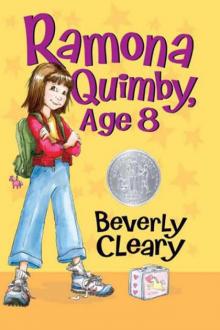 Ramona Quimby, Age 8
Ramona Quimby, Age 8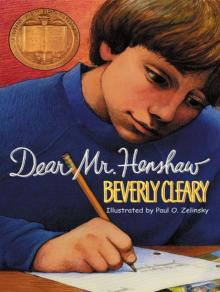 Dear Mr. Henshaw
Dear Mr. Henshaw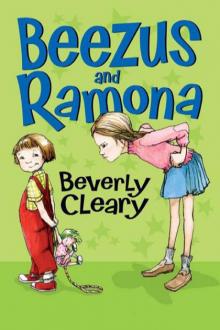 Beezus and Ramona
Beezus and Ramona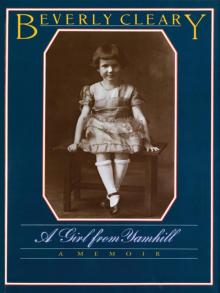 A Girl from Yamhill
A Girl from Yamhill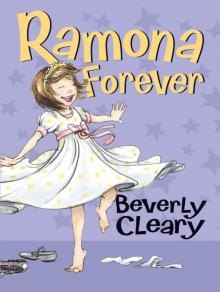 Ramona Forever
Ramona Forever Jean and Johnny
Jean and Johnny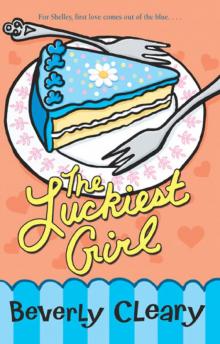 The Luckiest Girl
The Luckiest Girl Emily's Runaway Imagination
Emily's Runaway Imagination Ribsy
Ribsy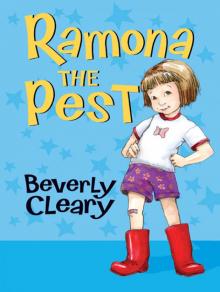 Ramona the Pest
Ramona the Pest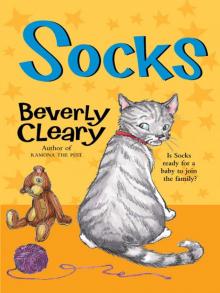 Socks
Socks Ramona's World
Ramona's World Strider
Strider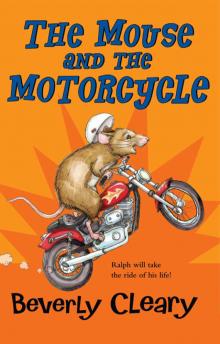 The Mouse and the Motorcycle
The Mouse and the Motorcycle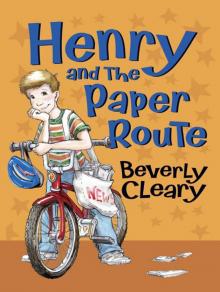 Henry and the Paper Route
Henry and the Paper Route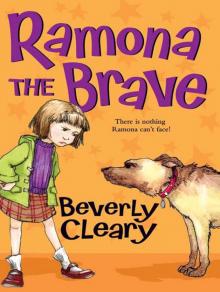 Ramona the Brave
Ramona the Brave Henry Huggins
Henry Huggins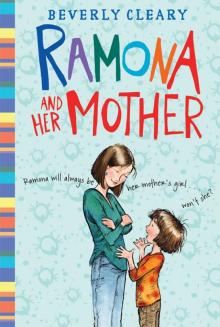 Ramona and Her Mother
Ramona and Her Mother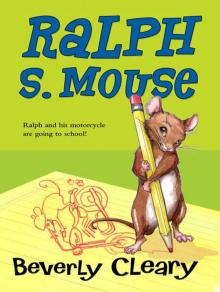 Ralph S. Mouse
Ralph S. Mouse Sister of the Bride
Sister of the Bride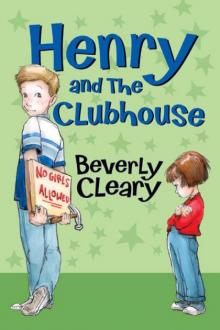 Henry and the Clubhouse
Henry and the Clubhouse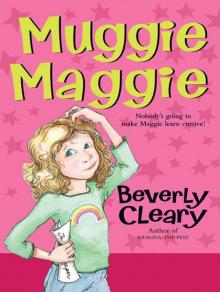 Muggie Maggie
Muggie Maggie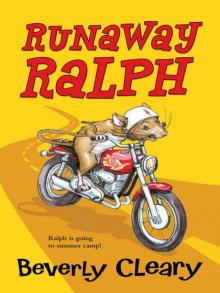 Runaway Ralph
Runaway Ralph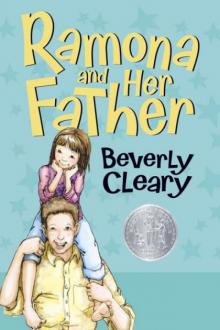 Ramona and Her Father
Ramona and Her Father Henry and Ribsy
Henry and Ribsy Henry and Beezus
Henry and Beezus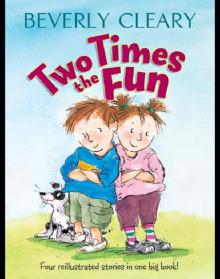 Two Times the Fun
Two Times the Fun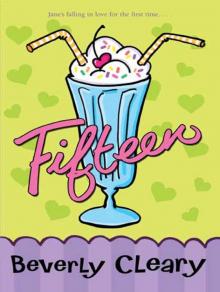 Fifteen
Fifteen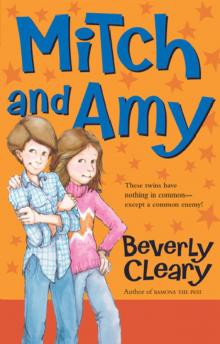 Mitch and Amy
Mitch and Amy